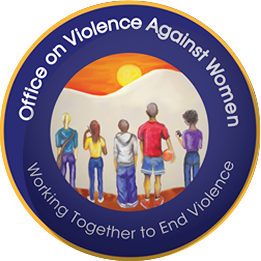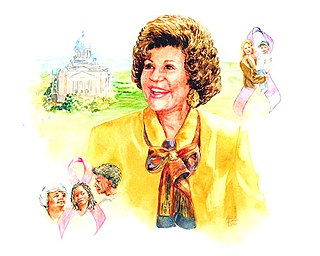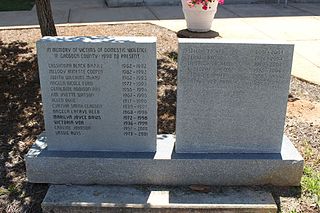
Esta Soler (born June 26, 1947 in Bridgeport, Connecticut, US) is an American activist who founded the social justice organization Futures Without Violence, and serves as president of FUTURES.

Esta Soler (born June 26, 1947 in Bridgeport, Connecticut, US) is an American activist who founded the social justice organization Futures Without Violence, and serves as president of FUTURES.
Soler was born in Bridgeport in 1947. She graduated from Simmons College with a Bachelor of Arts degree in 1968, then obtained her master's degree in Social Work from the University of Connecticut.
Soler became interested in anti-violence advocacy after hearing a speech from Dr. Martin Luther King Jr. in Bridgeport. In 1971, she became a social worker in San Francisco, assisting women in a drug treatment program. Soler learned that many of the women with drug dependencies had also suffered domestic abuse, and that trauma from that abuse was a leading contributor to their addictions. [1] She also learned that law enforcement did not take domestic violence seriously, and frequently did not arrest the abusers. In 1980, Soler established the Family Violence Prevention Fund, later renamed Futures Without Violence, in San Francisco to develop responses to domestic violence nationwide. [2] Under Soler's leadership, the organization was instrumental in passage of the Violence Against Women Act in 1994, as well as its re-authorizations and expansions in 2000, 2005, 2013, and 2022, and the Family Violence Prevention Services Act. [3] Soler is an outspoken advocate for the passage of the International Violence Against Women Act. [4]
Under Soler’s leadership, Futures Without Violence has launched four national public education campaigns in conjunction with The Advertising Council:
Soler has served a consultant and/or advisor for the Centers for Disease Control & Prevention, the Aspen Institute, and the Soros Justice Fellowship Program. Soler's work to prevent violence against women was featured on MAKERS, an interactive video and documentary project launched by AOL and PBS. [12] Soler delivered a TEDTalk charting 30 years of tactics and technologies—from the Polaroid camera to social media—that have shaped the movement to end domestic violence. [13] She is co-author of Ending Domestic Violence: Changing Public Perception/Halting the Epidemic [14] and has been published and interviewed extensively as an expert on domestic violence. [15] [16] [17] [18] [19] [20]
Soler serves on the boards of the Blue Shield of California Foundation and the Center for Family Policy and Practice. Soler was a member of the Violence Against Women National Advisory Council under Health & Human Services Secretary Donna Shalala and Attorney General Janet Reno. [2]
Violence is "the use of physical force so as to injure, abuse, damage, or destroy". Other definitions are also used, such as the World Health Organization's definition of violence as "the intentional use of physical force or power, threatened or actual, against oneself, another person, or against a group or community, which either results in or has a high likelihood of resulting in injury, death, psychological harm, maldevelopment, or deprivation."
Sexual assault is an act in which one intentionally sexually touches another person without that person's consent, or coerces or physically forces a person to engage in a sexual act against their will. It is a form of sexual violence that includes child sexual abuse, groping, rape, drug facilitated sexual assault, and the torture of the person in a sexual manner.

The Violence Against Women Act of 1994 (VAWA) is a United States federal law signed by President Bill Clinton on September 13, 1994. The Act provided $1.6 billion toward investigation and prosecution of violent crimes against women, imposed automatic and mandatory restitution on those convicted, and allowed civil redress when prosecutors chose to not prosecute cases. The Act also established the Office on Violence Against Women within the U.S. Department of Justice.

A women's shelter, also known as a women's refuge and battered women's shelter, is a place of temporary protection and support for women escaping domestic violence and intimate partner violence of all forms. The term is also frequently used to describe a location for the same purpose that is open to people of all genders at risk.

The United States Office on Violence Against Women (OVW) was created following the Violence Against Women Act (VAWA) of 1994. The Act was renewed in 2005, 2013 and again in 2022. The Violence Against Women Act legislation requires the Office on Violence Against Women to work to respond to and reduce violence against women in many different areas, including on college campuses and in people's homes. VAWA requires Office on Violence Against Women to administer justice and strengthen services for victims of domestic violence, dating violence, sexual assault, and stalking.
The Center Against Domestic Violence is an American not-for-profit organization dedicated to preventing violence in the family and promoting the well-being and economic independence of women and children. It provides safe shelters, a network of supportive services, advocacy, education and resource information, and coalition building.
This page examines the dynamics surrounding women in Tajikistan.
Intimate partner sexual violence (IPSV) deals with sexual violence within the context of domestic violence. Intimate partner sexual violence is defined by any unwanted sexual contact or activity by an intimate partner in order to control an individual through fear, threats, or violence. Women are the primary victims of this type of violence.

One of the most common forms of sexual violence around the world is that which is perpetrated by an intimate partner, leading to the conclusion that one of the most important risk factors for people in terms of their vulnerability to sexual assault is being married or cohabiting with a partner. Other factors influencing the risk of sexual violence include:

Domestic violence is violence or other abuse that occurs in a domestic setting, such as in a marriage or cohabitation. Domestic violence is often used as a synonym for intimate partner violence, which is committed by one of the people in an intimate relationship against the other person, and can take place in relationships or between former spouses or partners. In its broadest sense, domestic violence also involves violence against children, parents, or the elderly. It can assume multiple forms, including physical, verbal, emotional, economic, religious, reproductive, or sexual abuse. It can range from subtle, coercive forms to marital rape and other violent physical abuse, such as choking, beating, female genital mutilation, and acid throwing that may result in disfigurement or death, and includes the use of technology to harass, control, monitor, stalk or hack. Domestic murder includes stoning, bride burning, honor killing, and dowry death, which sometimes involves non-cohabitating family members. In 2015, the United Kingdom's Home Office widened the definition of domestic violence to include coercive control.
Specialized domestic violence courts are designed to improve victim safety and enhance defendant accountability. There is no one set definition of a specialized violence court, although these types of courts can be either civil or criminal and typically hear the majority of an area's domestic violence cases on a separate calendar. Additionally, these courts are typically led by specially assigned judges who can make more informed and consistent decisions based on their expertise and experience with the unique legal and personal issues in domestic violence cases.
Futures Without Violence is a non-profit organization with offices in San Francisco, Washington, D.C., and Boston, United States, with the goal of ending domestic and sexual violence. Futures Without Violence is involved in community-based programs, developing educational materials, and in public policy work.

Judi Jane Conway Patton is an American activist for women's safety and child abuse prevention. She served as the First Lady of Kentucky from December 12, 1995, until December 9, 2003, during the tenure of her husband, former Governor Paul E. Patton.

David Allen Wolfe is an academic, psychologist and author specializing in issues of child abuse, domestic violence, children and youth. His work includes the promotion of healthy relationships through school programs, with a major focus on the prevention of child abuse and neglect, bullying, dating violence, unsafe sex, substance abuse and other consequences of unhealthy relationships.

Domestic violence in United States is a form of violence that occurs within a domestic relationship. Although domestic violence often occurs between partners in the context of an intimate relationship, it may also describe other household violence, such as violence against a child, by a child against a parent or violence between siblings in the same household. It is recognized as an important social problem by governmental and non-governmental agencies, and various Violence Against Women Acts have been passed by the US Congress in an attempt to stem this tide.
The following outline is provided as an overview of and topical guide to domestic violence:

The management of domestic violence deals with the treatment of victims of domestic violence and preventing repetitions of such violence. The response to domestic violence in Western countries is typically a combined effort between law enforcement, social services, and health care. The role of each has evolved as domestic violence has been brought more into public view.

Violence against women in India refers to physical or sexual violence committed against a woman, typically by a man. Common forms of violence against women in India include acts such as domestic abuse, sexual assault, and murder. In order to be considered violence against women, the act must be committed solely because the victim is female. Most typically, these acts are committed by men as a result of the long-standing gender inequalities present in the country.
Casey Gwinn is an American attorney who served as the elected City Attorney of San Diego, California, from 1996 through 2004. He is credited as a pioneer of the Family Justice Center concept, under which multiple agencies work together under one roof to provide services to victims of domestic violence and sexual abuse.
Domestic violence in New Zealand, often called family violence or family harm is defined under New Zealand law as not only intimate partner violence but also violence against other family members, including children and extended family or whānau, as well as people living together in the same household, such as flatmates. It is estimated that one third of people in New Zealand have experienced intimate partner violence (IPV) within their lifetime, making New Zealand have the highest rate of domestic violence in 14 OECD countries. In 2020, New Zealand police responded to a domestic violence call every 4 minutes.
{{cite book}}: CS1 maint: others (link)